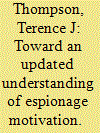|
|
|
Sort Order |
|
|
|
Items / Page
|
|
|
|
|
|
|
| Srl | Item |
| 1 |
ID:
158530


|
|
|
|
|
| Summary/Abstract |
The leaking of vast amounts of classified information to the media is a relatively recent phenomenon, with little data or research currently available to explain the behavior. Some parallels with espionage motivation seem to be present, as are certain psycho-social dynamics that appear to stimulate the behavior. Specifically, the intersection of narcissism and disgruntlement seems to supply fertile psychological grounds for mass leaking, as is often the case in espionage. These two elements are often exacerbated by (1) grandiose needs for recognition, (2) a culture of non-restraint, and (3) anonymity. The widely-known Edward Snowden and Bradley Manning cases offer some evidence for beginning an explanatory theory based on these factors.
|
|
|
|
|
|
|
|
|
|
|
|
|
|
|
|
| 2 |
ID:
130228


|
|
|
|
|
| Publication |
2014.
|
| Summary/Abstract |
The case of Edward Snowden, who in May 2013 revealed a huge number of National Security Agency codes, has again raised the question of motivation in espionage and disclosure of documents.
Espionage is a crime with complex, multi-faceted motivational factors that do not lend themselves to easy explanation. Most cases present a singular mosaic of intersecting psychosocial forces which culminate in a decision to engage in the crime. Espionage is committed by individuals from the lower middle to upper middle classes; unlike street crime, it is rarely, if ever, committed by the poor. What drives people of middle class privilege to choose to commit such a heinous crime?
The current model, postulated by numerous scholars and simplified here, holds that espionage occurs at the collision of an opportunity, a perceived life crisis, and a moral failing, which is then actuated by a trigger. 1 The spy must have an opportunity, which usually translates into access to information or a person. Access to information is typically gained through the holding of a security clearance. Such a trusted insider has minimally restrained access to classified information, and that access is usually defined by position. A senior scientist working on satellite systems obviously has significant access to classified satellite data but may have almost no access to human intelligence (HUMINT)-and vice versa. Conversely, and perhaps surprisingly, according to one study, 25 percent of known spies since World War II have held no security clearance. 2 These spies usually acted in concert with another individual (often a spouse or lover), or simply knew someone who did have access. This was the case in the Boyce-Lee case in California wherein Christopher Boyce held a security clearance and Dalton Lee did not. 3 Access, however derived, represents the most common opportunity to commit espionage.
|
|
|
|
|
|
|
|
|
|
|
|
|
|
|
|
|
|
|
|
|